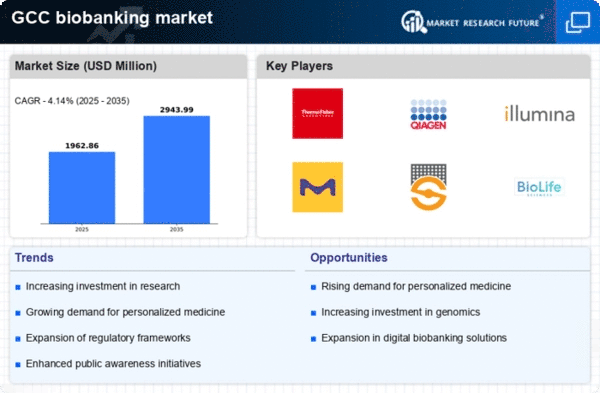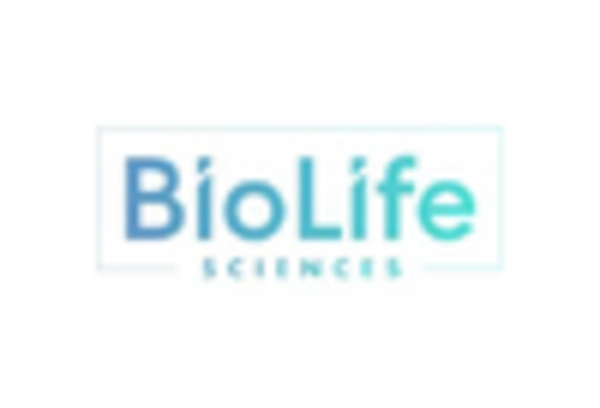Increased Research Collaborations
The biobanking market is witnessing an increase in research collaborations among academic institutions, healthcare organizations, and private companies in the GCC. These partnerships are often aimed at leveraging biobanked samples for various research initiatives, including drug development and disease studies. Collaborative efforts are likely to enhance the accessibility of biological samples, thereby fostering innovation in research methodologies. As more entities recognize the value of shared resources, the biobanking market is expected to expand, facilitating a more integrated approach to scientific inquiry and healthcare advancements.
Government Initiatives and Funding
Government initiatives in the GCC are significantly bolstering the biobanking market. Various national health programs are being launched to promote biobanking as a vital component of research infrastructure. For instance, the UAE government has allocated substantial funding to establish biobanks that support research in genomics and rare diseases. This financial backing is expected to enhance the capabilities of biobanks, facilitating the collection and storage of biological samples. As a result, the biobanking market is likely to witness increased investment, which could lead to improved technologies and methodologies for sample preservation and analysis.
Advancements in Biobanking Technologies
Technological advancements are playing a pivotal role in shaping the biobanking market. Innovations in sample collection, storage, and analysis technologies are enhancing the efficiency and reliability of biobanks. For example, automated systems for sample processing and advanced biorepository management software are becoming increasingly prevalent. These advancements not only improve operational efficiency but also ensure the integrity and quality of biological samples. As a result, the biobanking market is likely to see an increase in the number of biobanks adopting these technologies, which could lead to improved research outcomes and collaborations.
Growing Awareness of Disease Prevention
There is a growing awareness of disease prevention and health management among the population in the GCC, which is positively impacting the biobanking market. Public health campaigns are increasingly emphasizing the importance of early detection and personalized health strategies. This shift in focus is likely to drive the demand for biobanks, as they provide critical resources for research into preventive measures and treatment options. The biobanking market is expected to benefit from this trend, as more individuals and healthcare providers recognize the value of biobanked samples in understanding disease etiology and developing effective interventions.
Rising Demand for Personalized Medicine
The biobanking market is experiencing a notable surge in demand for personalized medicine, driven by advancements in genomics and biotechnology. This trend is particularly pronounced in the GCC region, where healthcare systems are increasingly focusing on tailored treatment options. The market for personalized medicine is projected to reach approximately $2.5 billion by 2026, indicating a compound annual growth rate (CAGR) of around 10%. This growth is likely to enhance the role of biobanks in providing essential biological samples and data for research and development. As healthcare providers seek to improve patient outcomes through individualized therapies, the biobanking market is positioned to play a critical role in supporting these initiatives.
















